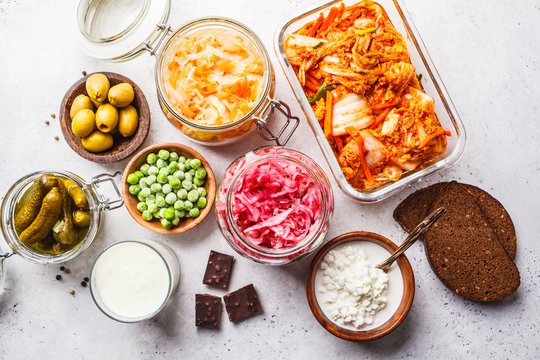Your gut is more than just a digestive system—it’s a powerhouse that influences your overall health, including your brain. The gut-brain axis, a two-way communication network between your digestive tract and brain, is gaining attention for its role in physical and mental well-being. Probiotics and fermented foods, packed with beneficial bacteria, are key players in supporting this connection. In this article, we’ll explore how probiotics and fermented foods can heal your gut, boost your brain, and enhance your overall health, backed by science and practical tips.
Understanding the Gut-Brain Connection
The gut-brain axis links your gastrointestinal system to your central nervous system through nerves, hormones, and the immune system. Your gut houses trillions of microorganisms, collectively called the gut microbiota, which play a critical role in:
- Digestion: Breaking down food and absorbing nutrients.
- Immune function: About 70% of your immune system resides in your gut.
- Mental health: Producing neurotransmitters like serotonin (up to 90% of which is made in the gut) and influencing mood, stress, and cognition.
An imbalanced gut microbiota (dysbiosis) can contribute to issues like irritable bowel syndrome (IBS), anxiety, depression, and cognitive decline. Probiotics—live beneficial bacteria—and fermented foods, which naturally contain probiotics or support gut health, can help restore balance and optimize this gut-brain connection.
What Are Probiotics and Fermented Foods?


- Probiotics: Live microorganisms that, when consumed in adequate amounts, provide health benefits by improving gut microbiota balance. Common strains include Lactobacillus and Bifidobacterium.
- Fermented Foods: Foods transformed by microorganisms (bacteria or yeast), which produce beneficial compounds like probiotics, enzymes, and short-chain fatty acids (SCFAs). Examples include yogurt, kefir, sauerkraut, kimchi, and kombucha.
Fermentation enhances nutrient bioavailability, adds probiotics, and creates compounds that support gut and brain health.
Five Key Benefits of Probiotics and Fermented Foods
Here’s how probiotics and fermented foods can transform your gut and brain health:
1. Restoring Gut Microbiota Balance
- How it works: Probiotics introduce beneficial bacteria that can crowd out harmful pathogens, reduce inflammation, and strengthen the gut lining. Fermented foods like sauerkraut and kimchi provide prebiotics (fiber that feeds good bacteria) and probiotics, fostering a diverse microbiota.
- Science says: A 2020 study in Nature Reviews Gastroenterology & Hepatology found that probiotics can alleviate symptoms of IBS and inflammatory bowel disease (IBD) by modulating gut microbiota.
- Impact on brain: A balanced gut microbiota supports the production of SCFAs like butyrate, which reduce inflammation and may protect against neurodegenerative diseases.
2. Reducing Inflammation
- How it works: Chronic inflammation in the gut can trigger systemic inflammation, affecting the brain and increasing risks for conditions like depression or Alzheimer’s. Probiotics and fermented foods reduce inflammatory markers by strengthening the gut barrier and regulating immune responses.
- Science says: A 2019 meta-analysis in Nutrients showed that probiotic supplementation reduced C-reactive protein (CRP), a key inflammation marker, in people with chronic conditions.
- Impact on brain: Lower inflammation improves mood and cognitive function, as inflammation is linked to anxiety and memory issues.
3. Boosting Mood and Mental Health
- How it works: The gut produces neurotransmitters like serotonin, dopamine, and GABA, which regulate mood and stress. Probiotics enhance the production of these chemicals, while fermented foods like yogurt provide precursors (e.g., tryptophan) for neurotransmitter synthesis.
- Science says: A 2021 study in Translational Psychiatry found that Lactobacillus and Bifidobacterium supplementation improved symptoms of depression and anxiety in clinical trials.
- Impact on brain: Regular consumption of probiotics may reduce stress, improve mood, and even alleviate symptoms of mild depression.
4. Enhancing Cognitive Function
- How it works: A healthy gut microbiota supports brain health by improving nutrient absorption (e.g., B vitamins, omega-3s) and reducing oxidative stress. Fermented foods like kefir provide antioxidants that protect brain cells.
- Science says: A 2023 study in Frontiers in Neuroscience showed that probiotic supplementation improved cognitive performance in older adults, potentially by enhancing gut-derived neurotrophic factors like BDNF (brain-derived neurotrophic factor).
- Impact on brain: Better gut health may improve memory, focus, and overall cognitive resilience, especially as you age.
5. Strengthening the Gut Barrier
- How it works: A leaky gut, where the intestinal lining becomes permeable, allows toxins and bacteria to enter the bloodstream, triggering inflammation and potentially affecting the brain. Probiotics and fermented foods strengthen the gut barrier by promoting tight junction proteins.
- Science says: A 2017 study in Gut Microbes found that Lactobacillus rhamnosus improved gut barrier function in animal models, reducing systemic inflammation.
- Impact on brain: A stronger gut barrier prevents “leaky gut syndrome,” which is linked to brain fog, fatigue, and mood disorders.
Top Fermented Foods for Gut and Brain Health
Incorporate these fermented foods to reap probiotic benefits:
- Yogurt: Choose plain, unsweetened yogurt with live cultures (e.g., Lactobacillus acidophilus). Pair with berries for added antioxidants.
- Kefir: A fermented milk drink with a diverse range of probiotics. Try it in smoothies or as a standalone drink.
- Sauerkraut: Fermented cabbage rich in Lactobacillus and fiber. Opt for unpasteurized versions to ensure live bacteria.
- Kimchi: A spicy Korean fermented vegetable dish with probiotics and anti-inflammatory compounds like ginger and garlic.
- Miso: Fermented soybean paste used in soups. It’s rich in probiotics and umami flavor but high in sodium, so use sparingly.
- Kombucha: Fermented tea with probiotics and antioxidants. Choose low-sugar options to avoid excess sugar intake.
- Tempeh: Fermented soybeans, high in protein and probiotics, great as a meat substitute.
How to Incorporate Probiotics and Fermented Foods
Here are practical tips to add these gut-healing foods to your diet:
- Start Small: If you’re new to fermented foods, begin with small portions (e.g., 1–2 tablespoons of sauerkraut) to avoid digestive discomfort.
- Diversify Your Choices: Rotate between yogurt, kefir, kimchi, and other fermented foods to promote microbial diversity.
- Pair with Prebiotics: Combine fermented foods with prebiotic-rich foods like bananas, oats, or asparagus to feed beneficial bacteria.
- Choose Unprocessed Options: Look for unpasteurized, live-culture fermented foods, as pasteurization kills beneficial bacteria.
- Limit Sugar and Additives: Avoid sugary yogurts or kombuchas with artificial flavors, as excess sugar can disrupt gut microbiota.
- Consider Supplements: If dietary sources are insufficient, probiotic supplements with strains like Lactobacillus or Bifidobacterium (10–50 billion CFU daily) can help, but consult a healthcare provider first.
Sample Day with Probiotics and Fermented Foods
Here’s a gut- and brain-boosting meal plan:
- Breakfast: Plain Greek yogurt with sliced banana, chia seeds, and a drizzle of honey.
- Snack: A small glass of kefir with a handful of walnuts.
- Lunch: Grilled chicken salad with mixed greens, avocado, and 1–2 tablespoons of sauerkraut.
- Snack: A low-sugar kombucha with a piece of fruit like an apple.
- Dinner: Miso soup with tofu, seaweed, and scallions, paired with steamed rice and broccoli.
Precautions and Considerations
While probiotics and fermented foods are generally safe, keep these in mind:
- Start Slowly: Too much too soon can cause bloating or gas, especially if your gut microbiota is imbalanced.
- Allergies or Sensitivities: Some people may be sensitive to histamine-rich fermented foods (e.g., sauerkraut, kimchi), which can cause headaches or digestive issues.
- Medical Conditions: If you have conditions like small intestinal bacterial overgrowth (SIBO) or are immunocompromised, consult a doctor before increasing probiotic intake.
- Quality Matters: Choose high-quality, minimally processed fermented foods to maximize benefits and avoid additives that harm gut health.
Final Thoughts
Probiotics and fermented foods are powerful allies for healing your gut and boosting your brain health. By restoring gut microbiota balance, reducing inflammation, and supporting neurotransmitter production, these foods can improve digestion, mood, and cognitive function. Start incorporating small amounts of yogurt, kefir, sauerkraut, or kimchi into your diet, and pair them with prebiotic-rich foods for maximum impact. Listen to your body, start slowly, and consult a healthcare provider if you have specific health concerns.
Harness the power of your gut to transform your mind and body—one fermented bite at a time!


